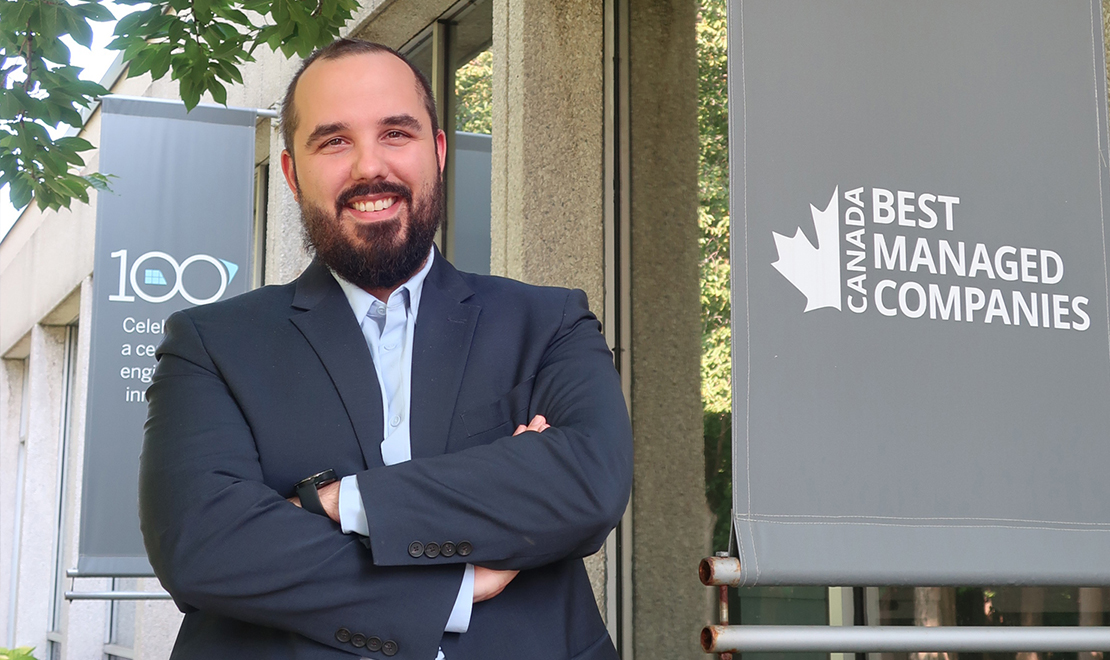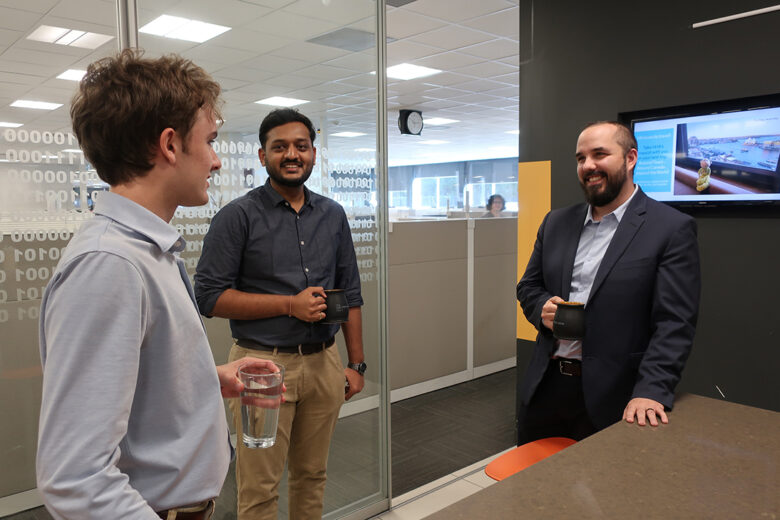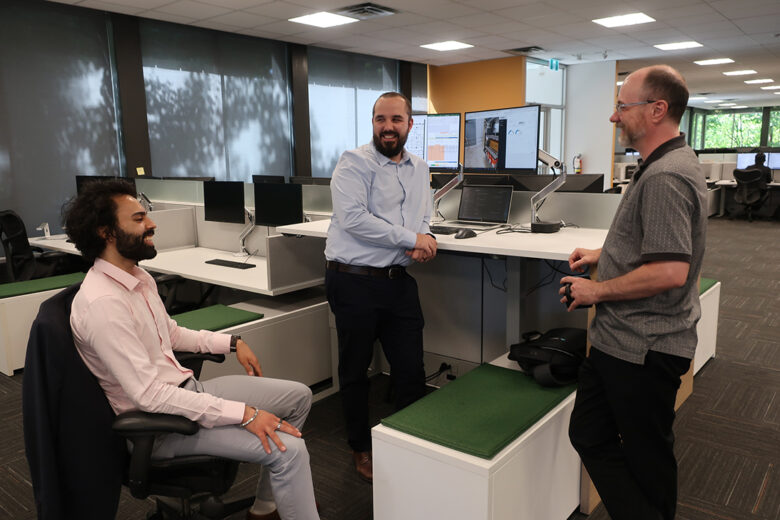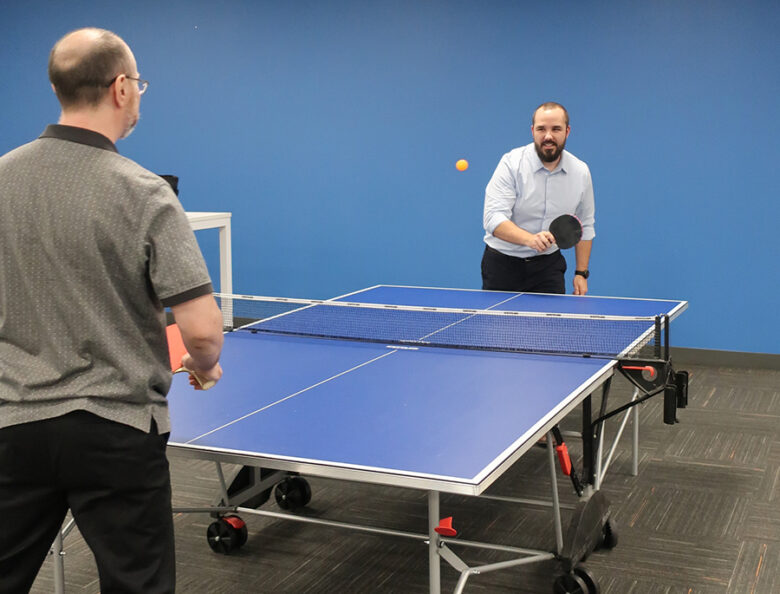Meet Paul Vandenberk – Project Manager, Digital Services, Mechanical Engineer

Paul joined HH Angus in 2021.
Why did you decide to study engineering?
As a kid, my favorite toy was Lego. I liked to build things, and especially take things apart. I typically would follow the instructions, play with it for a bit as it was intended, and then take it apart and build something completely different. I think it was my curiosity to figure out how things worked that drove me to engineering.
You've been in the oilfield business, defence, and robotics. Was that by design?
While I wasn't always seeking a change, I like the ability to get different perspectives and learn different skills and toolsets. I don’t like doing the same thing over and over long term because then you just become the master of one thing. When I was working in the defence industry, the calculations and simulations were a lot more intense because lives were at stake. Putting yourself outside your comfort zone and entering new industries gave me the confidence to tackle new challenges and work on the mentality that “I have a lot to contribute in many areas, and in others, I will learn.”
How would you explain your job to someone not in the digital services sector?
One of the phrases I use is ‘Jack of all Trades’. I do a lot of different things related to IoT and cloud projects. I prefer to describe what I do in terms of what our team does, because we rely very heavily on each other. While my role is Project Manager, I don't just manage projects. Our group is small, which means we all wear multiple hats. My elevator pitch is “I am part of a team that utilizes all kinds of technologies like IoT and cloud to develop end-to-end smart building technology solutions for clients.”
How do you contribute to the built environment, to making buildings work better?
In a similar way that a motivated DIY individual makes their home more efficient - by introducing or integrating smart technology. What I mean by that is, a homeowner may feel they're spending too much money on electricity and water, or that nobody turns off the lights, or certain tasks are time-consuming and repetitive. So, they install technical solutions to address those concerns. Obviously, we have highly trained people and, while we use different technology than a DIYer, we work on the same principles. We improve the built environment by providing our clients with data to identify where inefficiencies are happening, eg, where they are wasting energy or water, and by making recommendations on how their buildings could operate more efficiently.


Is there a project that you're particularly proud of?
Our biggest project to date is the one I’m most proud of because we created a 3D dashboard. It was a combination of sensor data and the building Revit model. That was very cool! Our group essentially made the visualization almost from scratch. We started with a base open-source app and did our own customization. Many companies say they do 3D visualizations but, in reality, they use vector graphics. This method has its merits, and I’m not knocking it. But our project was a live Revit model with near real-time occupancy data from the building overlaid.
The thing I like most about it was, during the pilot, we had two data points from some of their building systems - a flow rate and a temperature - and the client wanted to know about air quality. By combining these data points and data from the Revit model, we were able to create a third data point that they didn't have, all without any additional hardware required. To me, that's really cool! It is the perfect demonstration that if you break down data silos and combine them, you can actually generate new data and new insights without having to pay more for what you already have. That's what really excited me about that project.
Can you describe a typical day?
I really don't have a typical day. Anyone looking to join the Digital Services group, please know that you won’t have a typical day - and that’s good, I love that! Every day is different. It's always something new, something you didn't even think would come up. Sometimes we're researching new sensor hardware or trying out a new cloud platform … we're very much a prototyping kind of group. We get to test and play with many devices. We succeed in some things and fail in others, but that is all part of the discovery process, and to me, it is the core of engineering.
Is there any advice you’ve received that has particularly helped you in your career or given you good insight?
Yes, there were two. I'm very extroverted and in meetings, brainstorming sessions, or just in general, I tend to be very outspoken. As a result, whether it’s because I am loud or other colleagues are more introverted, I can drown out other people's good ideas. The advice was that if I listen more, I will be giving others a stage for their ideas and, in the end, they may have some really brilliant ideas that I would have never heard if I weren’t actively listening. I still follow that advice today by reminding myself that it's OK to sit back and let others generate ideas because if you let others flourish, they could have a better solution than what you had in mind.
The second piece of advice that I have taken to heart is to be more detail oriented, that speed isn't everything. When I first came out of school, I prided myself on how fast I could finish designs. But often, there would be small details that were incorrect, and those little details sometimes led to big costs. I remember being pulled aside and told “You're very good at what you do, but we need you to be more detail oriented.” So now, whenever I do reviews, I always challenge myself to find at least one problem, especially if I'm reviewing my own work before I submit it to someone else.
When you're talking to people outside the firm about working at HH Angus, what are some of the things that you tell them?
The Digital Services team is like a startup but with the backing of a big company. I’ve mentioned the variety of work that our group produces. There's never a dull day, very rarely are we repeating work, so it's never a case of ‘rinse and repeat’. I also talk about the quality of the people, the friendliness, everyone being willing to help. When you ask a question, no one stonewalls you and says, “I don't have time for you”. Everyone's willing to help and that goes a long way. It especially helps when you're new to the industry or to the working world. If people are willing to go out of their way to help you, it opens opportunities for mentoring and embedding new learnings and best practices early on.
Is there any part of your job that you particularly enjoy more than others?
The part that I enjoy most is probably also the part I enjoy least. It's a dichotomy because I love testing new sensors and new devices but because they’re new no one else on the team has ever dealt with them, so you're on your own. If you don't know the answer, you have to go find it. Sometimes it leads to days where you're frustrated because the thing should work but it doesn’t and then you have to figure out why. However, at the same time, it’s extremely gratifying when you finally get the answer, and it’s really cool that I get to do that.
What do you find inspiring in your work?
We get to play with all kinds of different technologies. The management team is very open-minded compared to some companies. If I want to test a new device, as long as I can confidently say, “I believe this is worth it. I think we should investigate this technology”, then they're behind me 100%. It's really nice to have that backing because then I get to have the fun of exploring new technology, whether it’s cloud-based or sensor-based or physical, without being stressed about having to justify an ROI or commit to when can we get that technology out there. Having a forum where you get to try out new technologies without the fear of failing is something that really motivates me and really gets me going every day.
What skill or character trait has helped you to advance in your career and do the work you do at a high level?
The biggest one is having the curiosity and ability to solve problems. For us to succeed as a group, we must be very good at finding answers. You need to believe in yourself enough to have the confidence to try things and figure out what works and what doesn’t.
Do you have any hidden talents or hobbies that would surprise people?
I've always found it gratifying to use my hands to build something, not just design it. I'm a hobby woodworker and I design and build a lot of my own woodworking projects; for example, I built my kitchen table and renovated my basement, so I enjoy being very hands-on!

